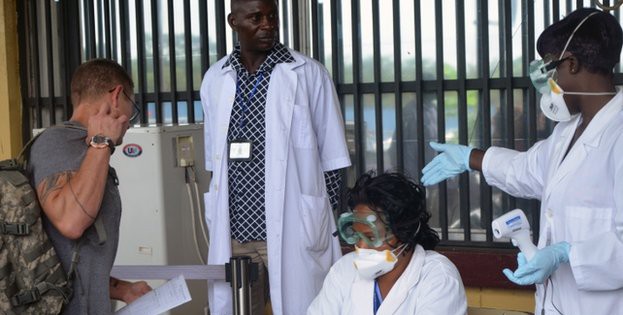
Controlling the Ebola virus outbreak at the source in West Africa is the most effective way to decrease international risk of transmission, according to a new analysis published in The Lancet.
If the epidemic persists and grows, it’s likely there will be more cases of the deadly virus exported to other countries – within Africa as well as in Europe, North America, and elsewhere – via air travel, said Dr. Kamran Khan, a physician and researcher at St. Michael’s Hospital.
Dr. Khan, who examines global airline travel patterns to predict the spread of diseases, said that every month, three Ebola-infected travelers are projected to leave West Africa, which is experiencing a widespread outbreak of the virus — and this number would only increase as the epidemic grows.
Dr. Khan and his co-authors said it is essential that other countries, their public health agencies and hospitals be prepared. The risk of international spread would be further compounded if this epidemic were to take hold in other countries, especially those with weak public health systems.
“The international community must be mindful and be ready to support the early detection and control of cases should they be imported into resource-limited countries,” Dr. Khan said.
Low- and lower-income countries in Africa are most at risk
Of the almost 500,000 travelers who flew on commercial flights out of Guinea, Liberia or Sierra Leone in 2013, the analysis showed that more than half were headed to destinations in five countries: Ghana (17.5 percent), Senegal (14.4 percent), the United Kingdom (8.7 percent), France (7.1 percent) and Gambia (6.8 percent). More than 60 percent of travelers from those countries in 2014 are expected to have final destinations in low- or lower-middle income countries.

Given that these countries have limited medical and public health resources, they may have difficulty quickly identifying and effectively responding to imported Ebola cases, said Dr. Khan.
While it might seem like banning flights from the affected areas would help stop the flow of infected travelers, Dr. Khan and other experts say just the opposite is true: International travel restrictions on countries with high rates of Ebola could have economic, health and humanitarian consequences that could compromise efforts to control the outbreak.
“There is a great danger that excessive travel restrictions could disrupt supply chains of necessary food, people, medicine and equipment to help fight the epidemic and cause severe economic hardship,” Dr. Khan said. As he points out, the 2005 International Health Regulations, signed by 196 countries, specify that steps to control the international spread of diseases should “avoid unnecessary interference with international traffic and trade.”
Exit screening is most effective way to reduce risk
While a number of countries, including Canada, the United States and England are implementing entry screening, Dr. Khan notes that exit screening of travelers leaving West Africa–as recommended by the World Health Organization–is by far the most effective form of travel regulations. However, as U.S. health officials have explained previously, implementing a travel ban would make it much more difficult to carry out effective exit screening, as travelers may be more likely to try to conceal their travel history.
Travel bans also complicate contact tracing and other efforts used to contain Ebola cases. The idea, experts say, is that in order to effectively stop Ebola from spreading, medical authorities have to be able to trace back a person’s movements and contacts. That becomes difficult if people are hiding their movements to circumvent the ban, making it much more likely that other people can become infected unknowingly.
Dr. Khan said that supporting humanitarian aid, increasing the number of health care workers, and providing logistical support and equipment would be the most effective way to prevent the international spread of Ebola from West Africa. In addition, focusing on exit screening as travelers leave affected countries would be more efficient than entry screening as they arrive in cities around the world.
Exit screening is a preventative measure and can be focused on three major international airports in affected countries, whereas entry screening would require far greater resources to implement. Entry screening, on the other hand, may detract resources from other important public health activities in countries with limited public health infrastructure, he said.
